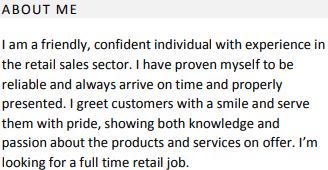There are many important aspects to a CV but your CV personal statement is perhaps the most important.
With so many applications to read through, the hiring manager wants to see a clear contender. They’re looking for someone who has the right skills, industry knowledge and attitude to succeed with their company.
Typically the hiring manager will spend only a few seconds reading your CV. Your CV personal statement is so important because it can demonstrate all of these things to the hiring manager in just a few short sentences.
What is a CV personal statement?
This section goes at the top of your CV, underneath your details. It is sometimes referred to by other names such as:
- Objective
- Career objective
- Career goal
- Personal profile
- Personal statement
- Introduction
- Summary
A personal statement for your CV has three key ingredients:
1. Who you are
In the first sentence, you’ll introduce yourself by stating who you are in a work context. If relevant (or required in the job advert) you might also state the amount of experience you have.
2. What makes you suitable for the role
The second sentence will focus on the work experience and skills you have that will benefit the company. You don’t have to go into too much detail here because your employment history and core skills section will adequately cover this. The key to completing this part is to ask: what are the most important requests in the job advert? Try to cover this in your second sentence to instantly show the employer you are the right person for the job.
3. What you are looking for
Your third sentence sets out your present career goals by stating what you want to achieve. Try to see this from the hiring manager’s perspective. They are recruiting for a particular position and don’t necessarily need to know your lifelong aspirations at this stage.
Here is an example of a personal statement for a CV:
Job title: Parts department service team member
[WHO YOU ARE] I am a diligent, hard-working customer service provider with more than 8 years experience in the motor trade and a passion for exceeding customers’ expectations.
[WHAT MAKES YOU SUITABLE FOR THE ROLE] I am competent in all aspects of the customer journey, from booking MOTs, ordering parts and liaising with the workshop to using databases, managing diaries and communicating effectively across the organisation.
[WHAT YOU ARE LOOKING FOR] I am looking for an opportunity within customer service with the opportunity to advance to a team leader position.
Although your personal statement is just a small part of your CV, it’s important to get off to a great start because it will be one of the first things the employer reads. Making a great first impression will leave the hiring manager wanting to know more, and consequently could land you an interview.
Here are some further examples of effective personal statements that follow the above formula:
Retail sales personal statement:

Accountancy personal statement:

Where to put your personal statement
Your personal statement CV section should serve as an introduction to your CV. It should go at the top just after your name and contact details. A well written personal statement will instantly grab the reader’s attention and leave them wanting to know more.
Personal statement length
A successful personal statement will be short and to the point – typically just one paragraph consisting of no more than 3 or 4 sentences. This is because lengthy blocks of text will just lose the hiring manager’s interest and land your CV squarely in the rejection pile. Above all, it should be engaging and focused upon the role you are applying for.
Aligning your personal statement with the job advert
Your personal statement can only be written after you’ve analysed the job advert. This is because only then can you fully understand what the employer wants. With only one paragraph, you have to show how you are the right person for the job. You should never write a generic personal statement because this suggests you are not really interested in their company or the position on offer.
Keeping your statement honest and realistic
Stating that you want to be the CEO in three years’ time may come across as a little arrogant, presumptuous and possibly unrealistic. Your personal statement needs to be realistic and focused upon the job on offer. Even if you would like to become a manager as soon as possible, you don’t need to show all your cards when an employer is looking to only fill this position.
You also need to be honest throughout your personal statement (and indeed, your CV) because even the slightest embellishment could hinder your chances of an interview. Likewise, avoid cliché statements as these can be spotted from a mile away. Stick to the facts whilst remaining positive, upbeat, engaging and relevant.
You may find this video from Deniz Sasal at LIG Academy helpful:
Top tips for success:
1. Get to the point
You’ve got about 3 or 4 sentences to use. Don’t fill them with waffle – you’ll dampen your impact. Pick out the key reasons why the employer should hire you, in the context of the job advert.
2. Use buzzwords sparingly
This is not the place to talk about being ‘highly motivated’, ‘a great communicator’ or ‘amazing team player’. You need to stick to hard facts here, such as length of experience or results. Sure, you might have covered these topics later on. However, the employer won’t read further if you stuff the profile with general, fluffy statements that have no value.
3. Don’t boast
This IS a good place to include key achievements from your track record. However, inflating those achievements will make you look insincere, arrogant or downright dishonest. If you detail achievements, make sure you’re not exaggerating to impress. The employer may be suspicious of your claims and you could lose out on that all-important interview
We have a huge collection of free CV templates with space to write your objective – check them out here.
